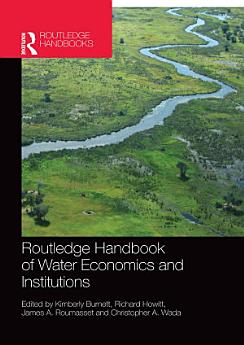Routledge Handbook of Water Economics and Institutions
About this ebook
Socially efficient water use does not generally coincide with private decisions in the real world, however. Examples of mechanisms designed to incentivize efficient behavior are drawn from agricultural water use, municipal water regulation, and externalities linked to water resources. Water management is further complicated when information is costly and/or imperfect. Standard optimization frameworks are extended to allow for coordination costs, games and cooperation, and risk allocation. When operating efficiently, water markets are often viewed as a desirable means of allocation because a market price incentivizes users to move resources from low to high value activities. However, early attempts at water trading have run into many obstacles. Case studies from the United States, Australia, Europe, and Canada highlight the successes and remaining challenges of establishing efficient water markets.
About the author
Kimberly Burnett is an Associate Specialist with the University of Hawaii Economic Research Organization. She has an extensive interdisciplinary background with extramural projects focusing on invasive species management; ecosystem service valuation; and system approaches to terrestrial, water, and marine ecosystems. She has authored numerous book chapters and peer-reviewed journal articles.
Richard Howitt is currently Professor Emeritus in Agricultural and Resource Economics at the University of California at Davis. He has been a faculty member at UC Davis since 1975. His teaching covered courses in resource economics. Current research interests are in disaggregated economic modeling, market mechanisms, and dynamic stochastic methods applied to water resources.
James Roumasset is a Professor in the Department of Economics at the University of Hawaii, Manoa. His research spans a variety of topics, including water and watershed management, energy economics, the new institutional economics, development microeconomics, and sustainable development. He has published over 50 peer-reviewed journal articles, three books, and numerous book chapters.
Christopher A. Wada is a Research Economist with the University of Hawaii Economic Research Organization. His work focuses primarily on various aspects of water management including groundwater pricing, watershed conservation, and assessment of supply-side alternatives. His research has been published in peer-reviewed journals, encyclopedias, and handbooks.




